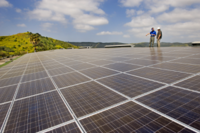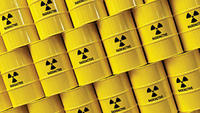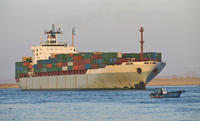-
Wastewater-treatment system to produce electricity
Scientists will bio-engineer bacteria to break down large amounts of solid waste using anaerobic digestion (without oxygen) in a reactor based on existing technology used by distilleries and pharmaceutical companies; they hope to be able to capture the gas from the process to generate electricity. Because the system would not produce other waste products, they also hope it could improve wastewater treatment in the developed world
-
-
Marines complete largest solar power system yet

The U.S. Marine Corps recently completed construction of a 1.4 megawatt solar electric system at Marine Corps Base Camp Pendleton; the solar installation is currently the largest system installed to date on a Marine base; the new system is expected to generate 2,400 megawatts each year and power roughly 400 homes; it will save the base $336,000 in energy costs annually; on Monday, the Corps announced a comprehensive strategy to harness solar energy in Afghanistan to reduce fuel consumption and save lives
-
-
Oil industry creates center for off-shore safety
Following several accidents on off-shore oil rigs, the U.S. oil and gas industry will launch a center dedicated to investigating safety issues related to off-shore drilling; the center will be operated by the American Petroleum Institute (API) but will be walled off from the trade group’s lobbying work
-
-
Growth of geothermal energy market lags behind wind and solar
According to a recently released report, the geothermal energy market is expected to grow over the next twenty years, but will still trail far behind wind and solar; currently only twenty-six countries in the world use geothermal energy to generate power, and as of 2010 there was a total global capacity of 10,715 megawatts; in June 2010, total global capacity of wind-powered generators was 175 gigawatts; by 2020 as much as 14.4 gigawatts of new geothermal capacity will be added at a 3 percent annual growth rate; the market value is estimated to be $6.8 billion by 2020; the expansion of geothermal energy still faces several impediments; at least 350 projects currently underway face financing, drilling rig, and skilled labor shortages
-
-
Thorium could be answer to South Africa's energy woes

South African scientists are increasingly touting thorium as a viable solution for the country’s energy woes; scientists believe that South Africa could use its plentiful reserves of thorium, a radioactive rare earth metal, to generate greenhouse gas-free electricity; South Africa’s aging energy infrastructure has led to rolling blackouts and energy rations; South Africa currently generates 78 percent of its energy from coal making it one of the largest contributors of greenhouse gases in the world; thorium is a better alternative to uranium in nuclear power production as it cannot be weaponized, does not need to be converted or enriched, its radioactive waste breaks down faster, and is less expensive and environmentally friendlier to extract
-
-
China races to claim Arctic resources
As temperatures around the world continue to rise and the ice in the Arctic Ocean melts, the once frozen seas are increasingly open for exploration and countries have been scrambling to claim the region’s vast resources; several countries including Canada, the United States, and Russia have all sought to expand their territorial claims over the region and now new countries like China are pushing in; Chinese researchers recently sailed to within 120 nautical miles of the North Pole; only a few years prior, this trip would have been impossible due to the thick ice in the ocean that can be more than 30 feet thick; scientists estimate that during the summer months, the Arctic Ocean could be ice-free by as early as 2013 or as late as 2060
-
-
DHS information officers discuss the future of technology at AFCEA
The senior technology officials of several DHS agencies gathered for a roundtable discussion at the AFCEA Homeland Security Conference in Washington, D.C. to outline their priorities, challenges, and plans for procuring technology and implementing capabilities at their respective departments; information officers from TSA, the U.S Coast Guard, the National Protection and Programs Directorate, and Citizen and Immigration Services were present; each official expressed similar plans to increase mobile access to data, digitize records, establish national databases, and streamline the flow of information; officials believe these remotely accessible databases can also help reduce costs and enhance customer service; the officials also noted the difficulty in hiring qualified personnel with cyber security skills
-
-
Common clam to help clean oil-filled waters

Clams are bottom-dwelling filter feeders, obtaining nutrients by filtering the water around them; researchers at Southeastern Louisiana University are studying the lowly Rangia clam to determine whether the organism can contribute to helping clean oil-polluted waters
-
-
Oil giants struggle to find more oil
Last week Exxon Mobil Corp’s annual financial report showed that the world’s largest oil company was struggling to find more oil; the report revealed that Exxon had only replaced 95 percent of the oil that it pumped out of the ground over the last decade; Exxon now holds more natural gas reserves than oil for future production; the company has replaced its natural gas reserves at higher rates than oil; in recent years large western oil companies have found that most of the accessible oil fields have been tapped, while new regions have been difficult to access both technically and politically; in 2010 Chevron announced that it had only replaced one barrel for every four it produced and Royal Dutch Shell PLC recently announced that next year it will produce more gas than oil for the first time in its company’s 104-year history
-
-
States challenge federal policy on nuclear waste storage

The search for a permanent solution to the storage of nuclear waste continues as three states sued the Nuclear Regulatory Commission (NRC) last week over its new policy on spent fuel; in December NRC issued a new policy stating that nuclear waste could be safely stored at a power plant for sixty years after a reactor went out of service; the issue of nuclear storage has become increasingly contentious after the Obama administration ruled out the use of a Department of Energy storage site in Nevada in 2009; nuclear plants have been forced to turn temporary on-site storage into long-term facilities as no permanent site has been built; the Obama administration launched a commission to find alternatives for the permanent nuclear storage site in Nevada that it cancelled
-
-
Safer wind turbine developed to minimize DHS objections

In the past wind turbine farms have faced opposition from the Department of Defense (DOD) and the Federal Aviation Administration (FAA) due to the interference they cause radar systems; wind turbines distort radars causing air traffic controllers to see them as storms and the interference generated by the wind farms can even cause planes to disappear completely from radar screens; a new wind turbine model will help minimize the impact that wind turbine fields have on radars; the model will be used by various government agencies including DHS, DOD, and the Department of Energy to decide whether a proposed wind farm can move forward
-
-
Wind energy's dirty secret
Vast tracts of land have been turned into toxic wastelands to fuel the increasing demand for green energy; rare Earth metals like neodymium are critical components in wind turbines and electric cars, but the process to extract them is damaging to the environment; China, the world’s largest supplier of rare Earth metals, has largely ignored environmental considerations and left Inner Mongolia a widening sea of radioactive waste; the United States is currently ramping up production of rare Earth minerals, but is seeking to find more sustainable production methods; wind power still has fewer environmental repercussions than coal or oil
-
-
Controversial nuclear reactor design moving toward approval
A controversial new nuclear reactor design is moving ahead for approval by the U.S. Nuclear Regulatory Commission (NRC); the chairman of the NRC announced that the agency would open the design for public comment before deciding whether to approve the reactor; critics of the proposed reactor, a Westinghouse AP1000, believe that in the event of an accident its safety measures are inadequate; if approved, the reactor could be used in as many as fourteen nuclear power plants
-
-
China's nuclear power expansion is based on thorium
The thorium fuel cycles produce almost no plutonium, and fewer higher-isotope residuals; thorium is much more abundant than uranium, and the reduced plutonium output eases proliferation concerns; the energy output per ton is also attractive; China has committed itself to establishing an entirely new nuclear energy program using thorium as a fuel; six heavy-water thorium reactors are planned in India, which has the world’s largest thorium deposits
-
-
Growing worries about security of Suez Canal

More than 35,000 ships crossed the Suez in 2009, about 10 percent of them oil tankers; if the Suez Canal were to close, oil tankers would be forced to sail around southern Africa — adding some 6,000 miles to the journey; this translates to an extra twelve days traveling from Saudi Arabia to Houston; based solely on speculation and risk, experts say the price of crude oil has gone up $5.00 a barrel since Friday; U.S. officials keep silent about how the United States might respond if Egyptian officials could no longer guarantee safe passage for the tens of thousands of ships that pass through the canal each year
-
More headlines
The long view
Strengthening the Grid’s ‘Backbone’ with Hydropower
Argonne-led studies investigate how hydropower could help add more clean energy to the grid, how it generates value as grids add more renewable energy, and how liner technology can improve hydropower efficiency.
LNG Exports Have Had No Impact on Domestic Energy Costs: Analysis
U.S. liquified natural gas (LNG) exports have not had any sustained and significant direct impact on U.S. natural gas prices and have, in fact, spurred production and productivity gains, which contribute to downward pressure on domestic prices.
